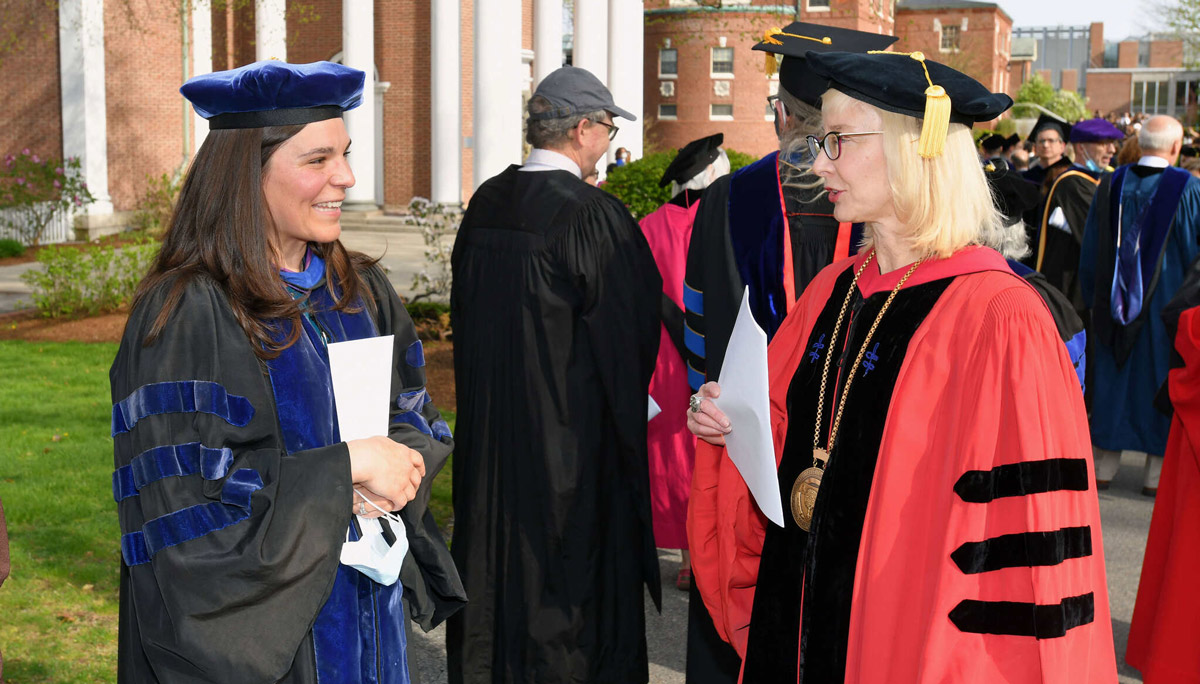Seeking equity in biology

Professor Laura Ekstrom’s endowed chair award will help expand inclusion
During Honors Convocation in May, The Bojan Hamlin Jennings Chair in the Natural Sciences was presented to Associate Professor of Biology Laura Ekstrom. The endowed honorary chair was established in 1987 with gifts from the Mars Foundation and Mr. and Mrs. Arnold Smith, in honor of Bojan Hamlin Jennings, who was a chemistry professor at Wheaton from 1943 to 1985. It is awarded to distinguished tenured faculty in chemistry, biology, physics or geology for outstanding teaching and research that strengthens Wheaton’s traditional liberal arts curriculum and reinforces its commitment to scholarship and creative teaching. Wheaton magazine editor Sandy Coleman recently asked her about her plans for the award.
What is the current focus of your scholarship?
“My broad research area is biomechanics, in which we leverage engineering-based approaches to study animal form and function. My current research focus is on the charismatic ocean sunfish, which can weigh up to 2,000 kilograms. These fish possess an unusual set of teeth located in their pharynx. By studying the function, anatomy and mechanical properties of these teeth, we hope to gain insight into the feeding habits and behavior of the ocean sunfish, and possibly figure out a method for determining the age of sunfish. They are a great source of unanswered questions around strange shapes and structures.”
How do you feel about receiving this award?
“It truly is an honor to have been selected for this award. Professor Bojan Hamlin Jennings was a pioneer in academia and a tireless supporter of women in the sciences, both at Wheaton College and beyond. Although her tenure as a Wheaton professor predated my arrival on campus, her dedication was legendary. From the stories I have heard of Professor Jennings, I know that she cared deeply for her students and did everything in her power to ensure they could succeed in a field that was often unwelcoming to women. I am humbled to continue her legacy of service through this award.”
How do you plan to use the award?
“The Biology Department, with help from Wheaton’s Howard Hughes Medical Institute Inclusive STEM Excellence grant, has been working diligently over the past two years to achieve greater equity and inclusion by significantly revising the biology major and much of the biology curriculum. I plan to continue moving us forward in this work through specific initiatives such as integrating inclusive material into our curriculum, increasing access to research opportunities, and demystifying the hidden curriculum [a familiarity with how college works] that can otherwise derail our students, particularly those at the introductory level. I know my colleagues in the natural sciences share these goals and prioritize identifying and reducing barriers to success in science. With their help, I hope to create a collaborative effort that will span multiple departments. We all benefit when all of our students feel fully supported and welcomed in our division.”
Why is this focus important?
“Biology is for everyone. For many of us, our first passion for science comes from childhood experiences of observing the natural world or an interaction with health care professionals. I hate to think of students who have held onto that passion for years, only to give up on their dream when they are confronted with seemingly insurmountable barriers to success. It is our obligation as educators to identify and dismantle those barriers so that all of our students can succeed in their chosen paths of health care, scientific research, environmental science, and so much more. Achieving a greater diversity of students and greater diversity of thought in our research labs and classrooms will lead to success for all of us. I hope that our students will recognize the importance of these practices, gain a deeper understanding of the history of biology and its current challenges, and finally, use what they have learned throughout their own career journeys beyond Wheaton.”
What is your greatest hope for the work you plan to do?
“My greatest hope is that this work will ensure that any student who wants to study biology will do so and that they will succeed. For too long we have had barriers in place that we didn’t even recognize. My hope is that this work can help to level the playing field and benefit all students who want to pursue biology.”
